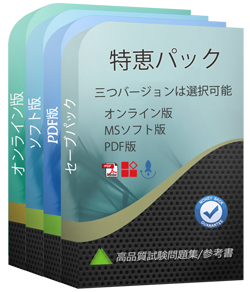本当質問と回答の練習モード
現代技術のおかげで、オンラインで学ぶことで人々はより広い範囲の知識(CPRP有効な練習問題集)を知られるように、人々は電子機器の利便性に慣れてきました。このため、私たちはあなたの記憶能力を効果的かつ適切に高めるという目標をどのように達成するかに焦点を当てます。したがって、PRA Certification CPRP練習問題と答えが最も効果的です。あなたはこのCertified Psychiatric Rehabilitation Practitioner有用な試験参考書でコア知識を覚えていて、練習中にCertified Psychiatric Rehabilitation Practitioner試験の内容も熟知されます。これは時間を節約し、効率的です。
現代IT業界の急速な発展、より多くの労働者、卒業生やIT専攻の他の人々は、昇進や高給などのチャンスを増やすために、プロのCPRP試験認定を受ける必要があります。 試験に合格させる高品質のCertified Psychiatric Rehabilitation Practitioner試験模擬pdf版があなたにとって最良の選択です。私たちのCertified Psychiatric Rehabilitation Practitionerテストトピック試験では、あなたは簡単にCPRP試験に合格し、私たちのCertified Psychiatric Rehabilitation Practitioner試験資料から多くのメリットを享受します。
信頼できるアフターサービス
私たちのCPRP試験学習資料で試験準備は簡単ですが、使用中に問題が発生する可能性があります。CPRP pdf版問題集に関する問題がある場合は、私たちに電子メールを送って、私たちの助けを求めることができます。たあなたが新旧の顧客であっても、私たちはできるだけ早くお客様のお手伝いをさせて頂きます。候補者がCertified Psychiatric Rehabilitation Practitioner試験に合格する手助けをしている私たちのコミットメントは、当業界において大きな名声を獲得しています。一週24時間のサービスは弊社の態度を示しています。私たちは候補者の利益を考慮し、我々のCPRP有用テスト参考書はあなたのCPRP試験合格に最良の方法であることを保証します。
要するに、プロのCPRP試験認定はあなた自身を計る最も効率的な方法であり、企業は教育の背景だけでなく、あなたの職業スキルによって従業員を採用することを指摘すると思います。世界中の技術革新によって、あなたをより強くする重要な方法はCertified Psychiatric Rehabilitation Practitioner試験認定を受けることです。だから、私たちの信頼できる高品質のPRA Certification有効練習問題集を選ぶと、CPRP試験に合格し、より明るい未来を受け入れるのを助けます。
CPRP試験学習資料の三つバージョンの便利性
私たちの候補者はほとんどがオフィスワーカーです。あなたはCertified Psychiatric Rehabilitation Practitioner試験の準備にあまり時間がかからないことを理解しています。したがって、異なるバージョンのCPRP試験トピック問題をあなたに提供します。読んで簡単に印刷するには、PDFバージョンを選択して、メモを取るのは簡単です。 もしあなたがCertified Psychiatric Rehabilitation Practitionerの真のテスト環境に慣れるには、ソフト(PCテストエンジン)バージョンが最適です。そして最後のバージョン、CPRPテストオンラインエンジンはどの電子機器でも使用でき、ほとんどの機能はソフトバージョンと同じです。Certified Psychiatric Rehabilitation Practitioner試験勉強練習の3つのバージョンの柔軟性と機動性により、いつでもどこでも候補者が学習できます。私たちの候補者にとって選択は自由でそれは時間のロースを減少します。
Psychiatric Rehabilitation Association Certified Psychiatric Rehabilitation Practitioner 認定 CPRP 試験問題:
1. What are the four most important factors that support recovery in psychiatric rehabilitation?
A) Family, home, resilience, and work
B) Family, community, religion, and relationships
C) Health, home, hope, and relationships
D) Health, home, community, and purpose
2. A practitioner provides services to two individuals with psychiatric disabilities who are roommates. One roommate told the practitioner she is concerned that the other is not taking his medications correctly. The practitioner would:
A) Privately convey the concern to the other roommate.
B) Listen to the roommate without disclosing any information.
C) Report the information to the roommate's psychiatrist.
D) Talk about the issue with the two roommates together.
3. The practitioner has completed a rehabilitation readiness assessment with the individual and they have decided they are ready to go to work. What would be the practitioners next best step?
A) Identify potential resources for employment opportunities
B) Assist the individual to find employment
C) Speak with the family on behalf of the individual
D) Establish a stronger relationship with the individual
4. An individual and her practitioner are in a treatment team meeting in which potential options for the individual are being discussed. The practitioner's priority is to advocate for an option that is:
A) Financially realistic.
B) Consistent with the individual's wishes.
C) Least restrictive.
D) Conducive to the individual's stability.
5. When integrating peer support services into their program, an agency needs to consider potential issues with
A) medication and symptoms.
B) power and boundaries.
C) stigma and confidentiality.
D) absenteeism and utilization of benefits.
質問と回答:
| 質問 # 1 正解: C | 質問 # 2 正解: B | 質問 # 3 正解: A | 質問 # 4 正解: B | 質問 # 5 正解: B |


 弊社は製品に自信を持っており、面倒な製品を提供していません。
弊社は製品に自信を持っており、面倒な製品を提供していません。



 Suzuki
Suzuki

